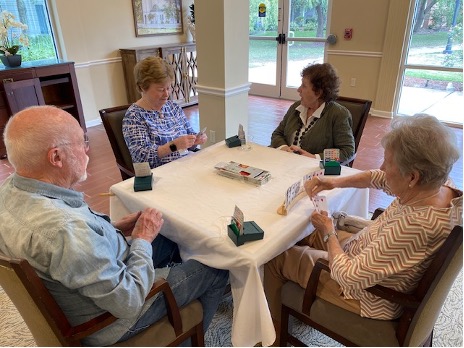Whether you’re looking for a solo activity or a way to connect with friends and family, card games and older adults make a winning hand. Card games aren’t just a form of entertainment; they offer a wide range of benefits, from mental stimulation to social connections. It doesn’t matter if you prefer the strategy of rummy and gin rummy, the solitude of solitaire, the teamwork of canasta, there are easy card games that everyone can enjoy.
In this blog, we’ll guide you through the rules of classic card games, explain why the odds are in your favor when shuffling those decks and explore how card games and Christwood Retirement Community make the perfect pair. But before we do, here’s a rundown of the card-related terminology we’ll refer to:
- Rank: A card’s numerical or face value indicating its importance in the game. For example, a standard deck includes numbers 2 to 10 and face cards like jack, queen and king.
- Suit: One of the four groups in a standard deck of cards (hearts, diamonds, clubs, spades) used to categorize and define the role of cards in specific games.
- Run: A sequence of consecutive cards of the same suit, often in numerical order, crucial in games like rummy for forming sets and earning points.
- Meld: Playing a specific card combination according to game rules, typically required for scoring points or achieving objectives, as seen in games like canasta or gin rummy.
- Round: A complete cycle of play in card games, consisting of turns where players follow game rules. Round length and purpose vary depending on the specific card game.
Rummy: A Classic Card Game for Older Adults
Rummy is a timeless favorite among card games. The objective is to form sets or runs of cards in your hand. You can play rummy with two to six players, and you’ll need a standard 52-card deck. Each player is dealt 10 cards in a two-player game, seven cards in a three- or four-player game, and six cards in a five- or six-player game. The remaining cards form the draw pile.
The goal is to form sets of three or four cards of the same rank or runs of three or more cards in the same suit. Players take turns drawing a card from the draw pile or the discard pile and then discarding a card. The game continues until a player goes out by forming valid sets or runs with their cards. In rummy, scoring is typically not used. The player who goes out first wins the round.
Gin Rummy: A Twist on Rummy for Card Game Enthusiasts
Gin rummy is a variation of rummy with some unique rules. It’s one of those great card games that enjoy a bit of strategy and challenge. Two players typically play gin rummy; you’ll need a standard 52-card deck. The goal is to form sets or runs of cards in your hand, just like in rummy. However, in gin rummy, players aim to create valid sets or runs using all the cards in their hand.
Players take turns drawing a card from the draw pile or the discard pile and then discarding a card. The game continues until a player goes out by forming valid sets or runs with all their cards. In gin rummy, scoring determines the winner of each round. Players score points for their unmatched cards, and typically play the game over several rounds. The player with the lowest score at the end of the predetermined number of rounds wins.
Solitaire: The Perfect Solo Card Game
Solitaire is one of the most iconic single-player card games and a great way to relax and exercise your brain. Solitaire is played with a standard 52-card deck. The cards are shuffled and laid out in seven piles, with the first pile having one card, the second pile having two cards, and so on, until the seventh pile has seven cards. The objective is to move all the cards to four foundation piles, one for each suit, in ascending order (from ace to king). Players take turns by moving cards between the piles and the foundation piles according to specific rules. You win the game when you successfully move all the cards to the foundation piles or when no more legal moves are possible.
Canasta: A Social Card Game
Canasta is a well-known card game that encourages social interaction and teamwork among four players in partnerships. You’ll need two standard 52-card decks, including four jokers, shuffled together, making 108 cards. Players sit across from their partners. The goal is to form melds, sets of cards of the same rank, and runs, sequences of consecutive cards in the same suit.
Players take turns drawing two cards from the draw pile and discarding one. Special cards, like wild cards, add strategic depth to the game. Canasta has a scoring system based on the value of cards in melds and bonuses for certain achievements. You play the game over several rounds and the team with the highest score wins.
One popular variation of canasta is hand and foot canasta, typically enjoyed by four players in partnership teams. Players are dealt two sets of cards — one to play with (the “hand”) and one to save for later (the “foot”). Players must complete their “hand” before using their “foot” cards.
Benefits of Card Games for Older Adults
Easy card games for older adults are a fantastic source of entertainment, whether you’re playing alone or with friends. They also keep your mind sharp by challenging your memory, problem-solving abilities and strategic thinking. Plus, they’re perfect for socializing, helping seniors connect with others and share laughs. And when you need a break from the stresses of life, they offer a relaxing way to unwind.
Card games for seniors are suitable for different settings and group sizes, offering an endless variety of games to discover and enjoy. They provide a unique blend of friendly competition and bonding with fellow players. Additionally, playing cards enhances hand-eye coordination.
And if you want to dive deeper into the world of card games, YouTube offers countless tutorials and instructional videos, and websites such as Bicycle Cards and Pagat also help teach card games.
Christwood and Cards Make the Perfect Pair
At Christwood, friendly competition and camaraderie are always in play. And our sprawling 117-acre campus offers plenty of inviting areas where residents can gather to shuffle decks and share stories. At any given moment, you’re bound to find a group on the Garden Patio, in The Atrium lobby or at the Community Center who’s down to play or create a new card-playing group.
It doesn’t matter if you’re a seasoned card shark, a newbie looking to learn the ropes or even if cards aren’t your game, the deck is always stacked in favor of fun and friendship at our senior living community. Bookmark this blog to keep these rules handy and explore Christwood’s website to take a peek into the lifestyle of the card players (and non-card players!) who live here.
Featured Image: Christwood Retirement Community





